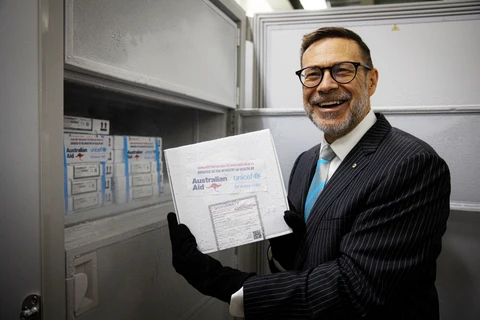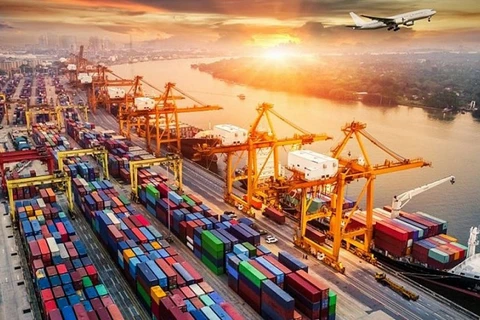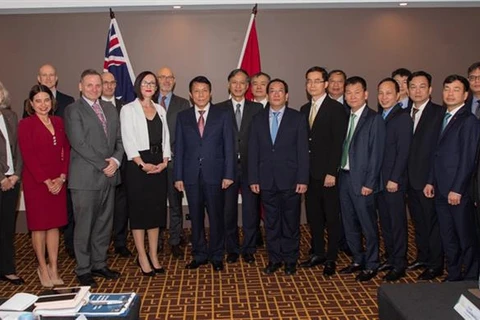Canberra (VNA) – From a backward, poor and essentially rural-based society and economy, isolated from the rest of the world, Vietnam has developed into a thriving, dynamic, modern, middle-income country with extensive international commercial and human links, former Australian Ambassador to Vietnam Graham Alliband has said.
In an interview granted to the Vietnam News Agency on the occasion of the 50th anniversary of the nations’ diplomatic relations (February 26, 1973-2023), he further said the changes in Vietnam over the last 32 years since he finished his term of office in the country have been dramatic, "almost revolutionary".
“I am constantly amazed at the physical transformation and the signs of prosperity I see both in the cities and the rural areas, even in the mountainous areas with large concentrations of ethnic minority peoples, such as Ha Giang and Mu Cang Chai. I am personally very happy to see these changes as I have witnessed much suffering, hunger and poverty from the time I first worked in war-torn Saigon as a young diplomat in 1972 and again in Hanoi in 1978,” said Alliband.
He went on noting some negative consequences of rapid economic development, especially pollution and the degradation of Vietnam’s biodiversity. However, he expressed his confidence that as the Southeast Asian nation becomes richer, and public awareness increases, these negatives will to a large extent be remedied, and current polluted rivers and coastal tracts will be restored.
Recalling the time he came to Vietnam as ambassador in 1988, two years after the beginning of the Doi Moi (reform), Alliband assessed that the process brought a new vigor and dynamism to the country that started to change in many ways.
“Doi Moi brought hope and aspirations for a better life and encouraged individual initiative and enterprise.”
In his mind, the new, hopeful atmosphere brought about by Doi Moi was symbolised by the sudden appearance one night in 1989 of bright streetlights throughout Hanoi.
The former ambassador also expressed his unforgettable impression of the rebirth of the private economy in the form of shops, markets, restaurants and coffee shops. “There was an eager curiosity about the ‘Western’ world, including Australia, and how Vietnam could benefit from closer links,” he said.
According to him, an important element of Doi Moi was the imperative for Vietnam to expand its international economic relations. One of the moments he was extremely proud of during his tenure was the first direct telephone call he made in 1989 between Ho Chi Minh City and Australia through the INTELSAT satellite system, installed in Vietnam by the Australian company OTCI (now Telstra). “This new telecommunications link symbolised Vietnam’s entry into the broader international community,” he said.
The former diplomat said there were a number of areas where, as Ambassador, he facilitated to strengthen the relations between Vietnam and Australia. They included the signing of a bilateral trade agreement and an investment agreement; negotiations for a consular agreement; the promotion of investment by Australian companies; academic and cultural exchanges; provision of disaster relief for flood victims in Moc Chau and typhoon victims on Quang Nam's Cu Lao Cham island and in Thai Binh's Tien Hai district; provision of a modest aid programme through UN agencies, including English-language training; and the introduction of a scholarship programme at the Australian National University in tertiary economics for researchers at the Central Institute for Economic Management (CIEM) under Vietnam’s Ministry of Planning and Investment.
“In promoting Australian investment, I made speeches at the Australia Chambers of Commerce in both Hong Kong and Bangkok, where I predicted that Vietnam would become the next Asian ‘Tiger’,” he said.
Sensing the critical importance of expanding the teaching of English if Vietnam was going to join the international community, he facilitated the first Australian volunteer English-language teacher to work in Vietnam and used the small Ambassador’s fund to provide equipment and English-language textbooks to foreign language faculties at five universities.
“I also supported with equipment and books the establishment in mid-1991 of the first semi-independent English language centre in Hanoi (perhaps in all of Vietnam), managed by two English-language teachers from the then Hanoi University of Foreign Languages (now Hanoi University), who had been trained in Australia,” he said, adding young Vietnamese people were very keen to learn English.
Given the countries’ celebration of their five-decade diplomatic ties this year, Alliband recalled that in March 2018, the sides signed an agreement to establish a strategic partnership.
“I am constantly amazed at the physical transformation and the signs of prosperity I see both in the cities and the rural areas, even in the mountainous areas with large concentrations of ethnic minority peoples, such as Ha Giang and Mu Cang Chai. I am personally very happy to see these changes as I have witnessed much suffering, hunger and poverty from the time I first worked in war-torn Saigon as a young diplomat in 1972 and again in Hanoi in 1978,” said Alliband.
He went on noting some negative consequences of rapid economic development, especially pollution and the degradation of Vietnam’s biodiversity. However, he expressed his confidence that as the Southeast Asian nation becomes richer, and public awareness increases, these negatives will to a large extent be remedied, and current polluted rivers and coastal tracts will be restored.
Recalling the time he came to Vietnam as ambassador in 1988, two years after the beginning of the Doi Moi (reform), Alliband assessed that the process brought a new vigor and dynamism to the country that started to change in many ways.
“Doi Moi brought hope and aspirations for a better life and encouraged individual initiative and enterprise.”
In his mind, the new, hopeful atmosphere brought about by Doi Moi was symbolised by the sudden appearance one night in 1989 of bright streetlights throughout Hanoi.
The former ambassador also expressed his unforgettable impression of the rebirth of the private economy in the form of shops, markets, restaurants and coffee shops. “There was an eager curiosity about the ‘Western’ world, including Australia, and how Vietnam could benefit from closer links,” he said.
According to him, an important element of Doi Moi was the imperative for Vietnam to expand its international economic relations. One of the moments he was extremely proud of during his tenure was the first direct telephone call he made in 1989 between Ho Chi Minh City and Australia through the INTELSAT satellite system, installed in Vietnam by the Australian company OTCI (now Telstra). “This new telecommunications link symbolised Vietnam’s entry into the broader international community,” he said.
The former diplomat said there were a number of areas where, as Ambassador, he facilitated to strengthen the relations between Vietnam and Australia. They included the signing of a bilateral trade agreement and an investment agreement; negotiations for a consular agreement; the promotion of investment by Australian companies; academic and cultural exchanges; provision of disaster relief for flood victims in Moc Chau and typhoon victims on Quang Nam's Cu Lao Cham island and in Thai Binh's Tien Hai district; provision of a modest aid programme through UN agencies, including English-language training; and the introduction of a scholarship programme at the Australian National University in tertiary economics for researchers at the Central Institute for Economic Management (CIEM) under Vietnam’s Ministry of Planning and Investment.
“In promoting Australian investment, I made speeches at the Australia Chambers of Commerce in both Hong Kong and Bangkok, where I predicted that Vietnam would become the next Asian ‘Tiger’,” he said.
Sensing the critical importance of expanding the teaching of English if Vietnam was going to join the international community, he facilitated the first Australian volunteer English-language teacher to work in Vietnam and used the small Ambassador’s fund to provide equipment and English-language textbooks to foreign language faculties at five universities.
“I also supported with equipment and books the establishment in mid-1991 of the first semi-independent English language centre in Hanoi (perhaps in all of Vietnam), managed by two English-language teachers from the then Hanoi University of Foreign Languages (now Hanoi University), who had been trained in Australia,” he said, adding young Vietnamese people were very keen to learn English.
Given the countries’ celebration of their five-decade diplomatic ties this year, Alliband recalled that in March 2018, the sides signed an agreement to establish a strategic partnership.
“Subsequently, an ambitious Action Plan was agreed to implement the Partnership over the period 2020-2023 focusing on three pillars: strengthening economic-trade linkages; deepening strategic-defense-security cooperation; and building knowledge and innovative partnerships. The Action Plan shows the breadth and depth of the existing relationship and through its thorough implementation will solidify the relationship even further. The next step would be to raise the relationship to a comprehensive strategic partnership which would intensify the relationship even further and expand cooperation in such areas as climate change, green economy and clean energy,” he said.
The former ambassador said fortunately, while the countries have different political systems, there are no substantive issues causing strain or potential conflict in their bilateral relations; their shared commitment to a rules-based international order, an open international economic system; their extensive human links; and their largely complementary economies foreshadow a very fruitful and exciting future relationship between the two countries.
“I am very happy to continue to contribute in a very small way to the burgeoning relationship as a consultant for Australia’s scholarship programme for Vietnam,” Alliband concluded./.
The former ambassador said fortunately, while the countries have different political systems, there are no substantive issues causing strain or potential conflict in their bilateral relations; their shared commitment to a rules-based international order, an open international economic system; their extensive human links; and their largely complementary economies foreshadow a very fruitful and exciting future relationship between the two countries.
“I am very happy to continue to contribute in a very small way to the burgeoning relationship as a consultant for Australia’s scholarship programme for Vietnam,” Alliband concluded./.
VNA

























